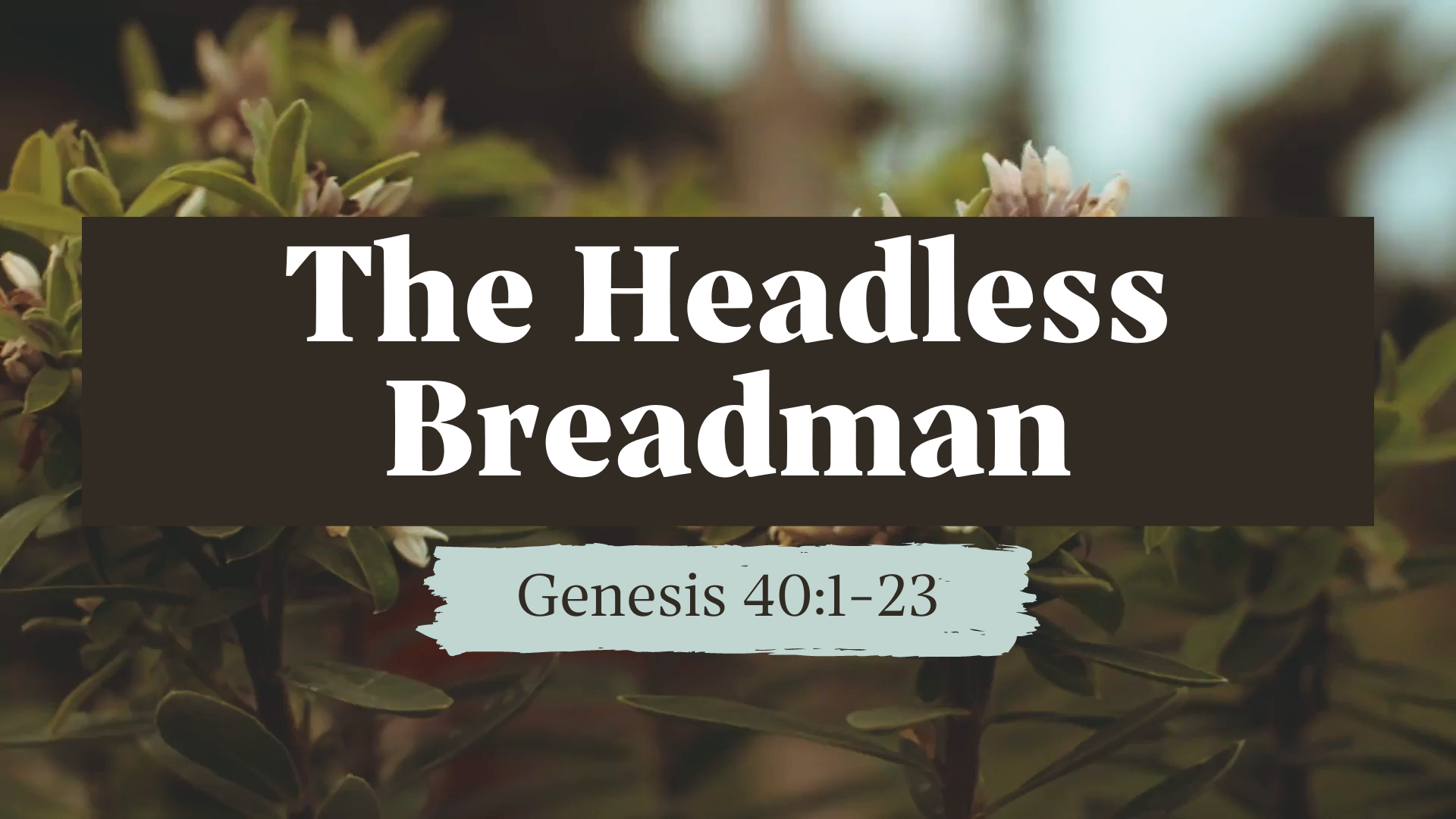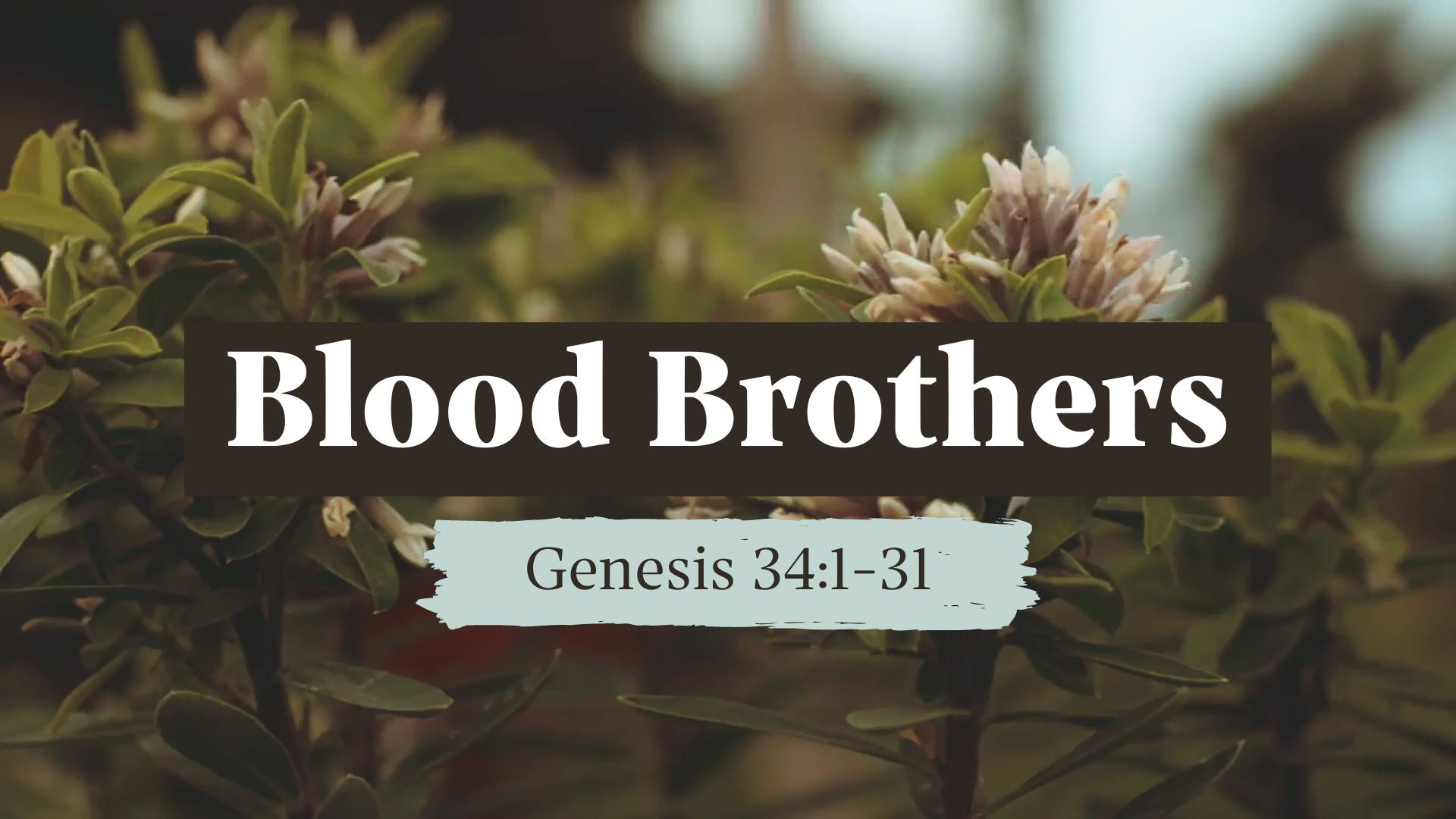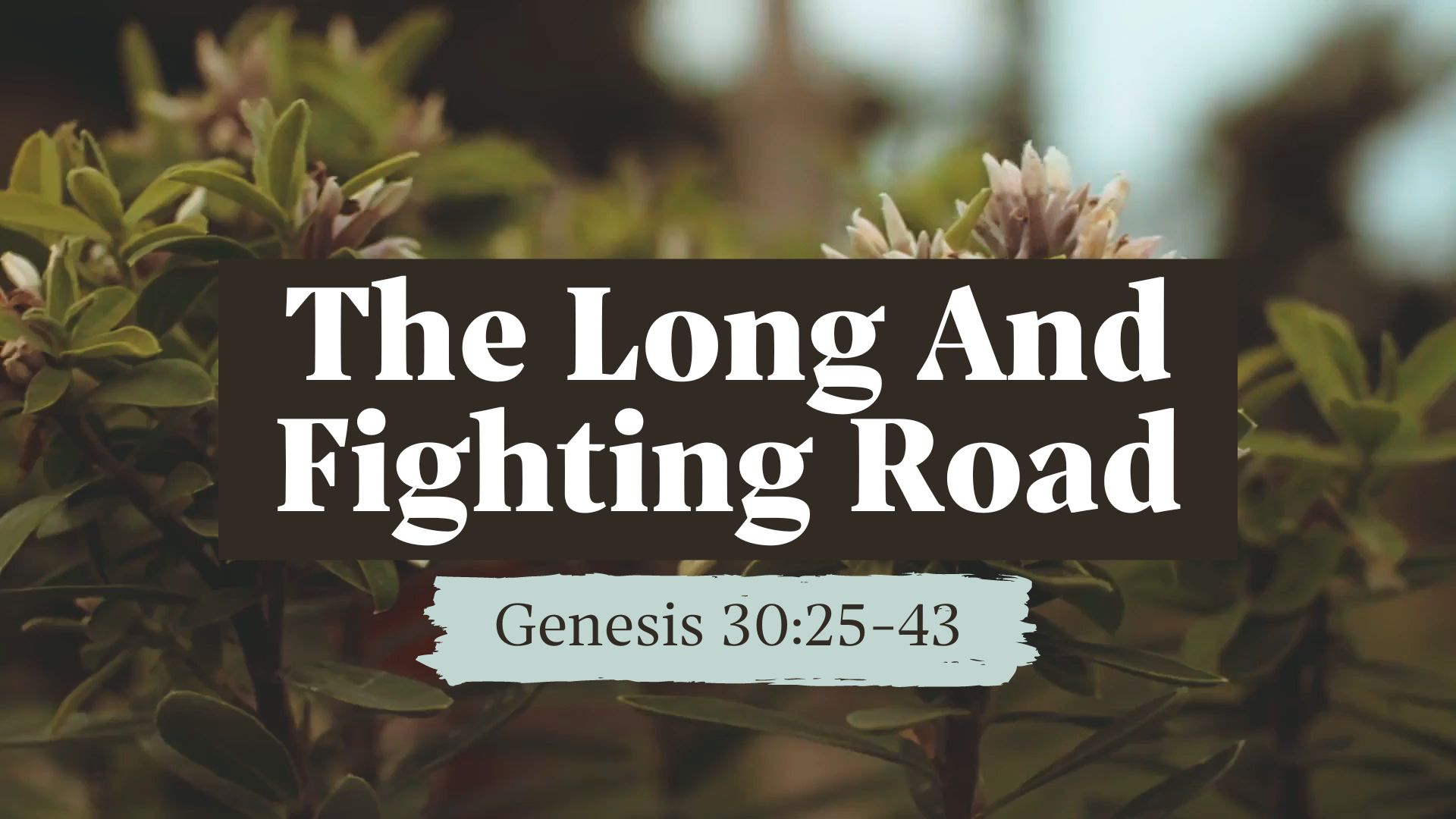
The Headless Breadman (Genesis 40:1-23)
For 15 years, Locked Up Abroad has told stories of people being jailed while traveling. Some episodes feature people who were kidnapped and at least one tells the story of a British man who was arrested and faced a 14-year prison sentence in the Philippines for the charge of adultery.[1]
I’ve never been on an episode of Locked Up Abroad, but Jacob, Alex, and I have been to one of the prisons featured in a few episodes called Lurigancho in Peru. The internet tells me that the locals call it The House Of The Devil.[2]
Joseph found himself imprisoned after being falsely accused by a lady who tried to commit adultery with him. When all was said and done, he would spend 13 years as a slave and a prisoner.
We aren’t sure how bad the jail was. On the one hand, Joseph had a lot of agency in it. It was a political prison, which might lend itself to better accommodations. On the other hand, it was still an ancient prison. Joseph characterizes it as a pit and dungeon. It’s not where he wanted to be.
At the same time, while he was there, he kept himself busy with ministry. Through his faithfulness, we’re given a powerful example of what the Master commanded His servants in the Parable of the Ten Minas when He said, “Occupy till I come,” or, “Engage in business until I come back.”[3]
Do you feel like you’re tied to your desk or in a dead-end job? Or, if we’re being more cheery, are you hoping to minister to people around you or are you excited to see the promises of God coming to fruition in your life? Either way, Joseph’s experience has a lot to show us.
Genesis 40:1-4 – After this, the king of Egypt’s cupbearer and baker offended their master, the king of Egypt. 2 Pharaoh was angry with his two officers, the chief cupbearer and the chief baker, 3 and put them in custody in the house of the captain of the guards in the prison where Joseph was confined. 4 The captain of the guards assigned Joseph to them as their personal attendant, and they were in custody for some time.
Joseph was 28 years old at the time and has been made the unofficial assistant warden, even though he’s a prisoner himself.
The two new prisoners who arrive are members of Pharaoh’s court: The cupbearer, who is also called the butler in some translations, and the chief baker. We’re not told what they are accused of or if they did it, but the prison warden – maybe Potiphar – assigns Joseph to them as a personal attendant. So not only is he incarcerated but now he’s supposed to act as a servant while in prison. But one translation puts it this way: “[He] assigned Joseph to them and he ministered to them.”[4] It’s the same term that Moses will later use to speak of serving in the tabernacle.[5]
As Christians, we are not to think of life through the lens of circumstances. Had Joseph done that, what result could there be but anger and bitterness and the death of faith? Instead, we can choose to see life the way God sees it. We know that God has scattered us into a particular time and place so that we will grope for Him, be in relationship with Him, and then be used by Him for His glory and as participants in His unfolding work to rescue the lost.
Joseph wasn’t happy about being in that jail. He wants out. But he was serious about opportunities to minister to people and to glorify God even in his terrible circumstances.
Genesis 40:5-7 – 5 The king of Egypt’s cupbearer and baker, who were confined in the prison, each had a dream. Both had a dream on the same night, and each dream had its own meaning. 6 When Joseph came to them in the morning, he saw that they looked distraught. 7 So he asked Pharaoh’s officers who were in custody with him in his master’s house, “Why do you look so sad today?”
Joseph’s example here is remarkable. Remember: On the human level, Egyptians were his enemies. Or, at best, they were in the category of other that he and his family would otherwise try to avoid. These two men represent the oppressive regime that was keeping Joseph in prison. But Joseph was a man with real faith and that faith produced compassion in his heart. He acted like the little Hebrew girl who had been abducted and enslaved into Naaman’s house in Syria. That’s the worst set of circumstances imaginable. But she saw Naaman’s leprosy and said, “If only my master could see the man of God in Israel, he would be healed.”
Joseph sees the anguish on their faces and does not wait for them to ask. He takes the initiative to reach out to them and see if he can provide relief.
The butler and the baker were convinced their dreams were not normal. They were under a lot of stress, but this was different. There was a weight and a prescience to the dreams that they couldn’t shake. Egyptians believed that dreams put a person in direct contact with world where the dead and the gods dwelt.[6]
Joseph and his family also believed some dreams could be sent from God – Joseph’s own father had experienced that. And Joseph seems to have well-established opinions about dreams, their importance, and interpretation.
What about our dreams? Does God still speak through them today? Peter preached in the book of Acts that Joel’s prophecy about dreams and visions still had application in the Church Age, but we shouldn’t assume a strange dream is Divine. Maybe it is, but the primary source of wisdom and prophecy given to us is the Word of God. God says, “If you lack wisdom, ask Me for it and I’ll give it to you.”[7] At the same time, the Bible doesn’t tell us God will never speak to us through a dream. If He does, it will be totally in line with Scripture because Scripture is His Word and our authority.
Genesis 40:8 – 8 “We had dreams,” they said to him, “but there is no one to interpret them.” Then Joseph said to them, “Don’t interpretations belong to God? Tell me your dreams.”
The butler and the baker were convinced these dreams meant something. The problem was that they had been taught that understanding dreams was a complex science that required special people – magicians – to give you the solution to the puzzle. Being in prison meant they had no access to those ‘experts,’ so they felt hopeless.[8]
Joseph responds with this great, culture-breaking moment. He casually says, “You don’t need those guys. What was your dream?” He’s matter-of-fact about it, but there’s a lot for us in this example. First, he gives these guys the impression that God – the real God – is definitely willing to interact with them. There were no hoops for them to jump through before God might give them wisdom.
Second, Joseph explained that their circumstances weren’t a problem. Their thinking was, “If we were in better shape – if we were in a better position, our gods might be able to give us some insight.” But Joseph boldly says, “God is with me and He is a Helper and He is willing to help you.”
Third, Joseph gave them hope but made no promises. He did not say, “I’ll definitely tell you what your dreams mean.” He’s honest but doesn’t exaggerate beyond what he knows to be true.
This is a great example for us as we represent a loving God to needy people. There’s also a great devotional reminder here. These guys were trying to figure out their lives and they assumed they needed the “experts” to guide them. Joseph comes along and says, “What you need is the Lord.”
We’re not against education – we’re not necessarily anti ‘experts,’ but let’s ask this question: These sages that they were so dependent on, these experts in dream science, did they actually know anything about dreams or about the future? No! We want to be very careful about which well of wisdom we’re drinking from. The Egyptians would formally school their wise men in a place called the “Houses of Life,”[9] but Joseph tells these guys, “God knows the truth and He will help you and He wants to explain life to you directly.” The same is true today.
Genesis 40:9-13 – 9 So the chief cupbearer told his dream to Joseph: “In my dream there was a vine in front of me. 10 On the vine were three branches. As soon as it budded, its blossoms came out and its clusters ripened into grapes. 11 Pharaoh’s cup was in my hand, and I took the grapes, squeezed them into Pharaoh’s cup, and placed the cup in Pharaoh’s hand.” 12 “This is its interpretation,” Joseph said to him. “The three branches are three days. 13 In just three days Pharaoh will lift up your head and restore you to your position. You will put Pharaoh’s cup in his hand the way you used to when you were his cupbearer.
Joseph’s interpretation seems impossible. How could the butler go from pit to palace in three days? His reputation is destroyed. Pharaoh doesn’t trust him – he’s furious with him. But Joseph says with confidence and boldness and faith, “This is what is going to happen.”
Genesis 40:14-15 – 14 But when all goes well for you, remember that I was with you. Please show kindness to me by mentioning me to Pharaoh, and get me out of this prison. 15 For I was kidnapped from the land of the Hebrews, and even here I have done nothing that they should put me in the dungeon.”
This is a helpful thing to see. Joseph is not trying to escape. There’s no secret tunnel that he’s been digging. But he does want out and that’s ok! We don’t have to love suffering. It’s not less spiritual to prefer blessing to difficulty. You can pray for deliverance from trials and hurts. But, throughout our struggles, we’re called to be people of faith and ministry, no matter the circumstances.
Genesis 40:16-17 – 16 When the chief baker saw that the interpretation was positive, he said to Joseph, “I also had a dream. Three baskets of white bread were on my head. 17 In the top basket were all sorts of baked goods for Pharaoh, but the birds were eating them out of the basket on my head.”
In his dream, we see baskets of bread and baked goods. I found it interesting that an ancient Egyptian dictionary has been found that lists 38 kinds of cake and 57 varieties of bread.[10]
As long as Joseph was handing out fortune cookies with winning lottery numbers, the baker wanted to get in on it, too! He knew there were parallels between the two dreams and, on top of that, in the Egyptian culture, birds functioned as symbols of royalty, the king in particular.[11]
What seemed like a very similar dream did have a few key differences. The butler had been very active in his dream. He’s taking the grapes, squeezing them, placing the cup in Pharaoh’s hand. The baker is motionless. Nahum Sarna points out that, in the dream: “The baker has neither the strength nor the presence of mind to drive [the birds] away – an ominous detail.”[12]
Genesis 40:18-19 – 18 “This is its interpretation,” Joseph replied. “The three baskets are three days. 19 In just three days Pharaoh will lift up your head—from off you—and hang you on a tree. Then the birds will eat the flesh from your body.”
The baker would be beheaded and impaled on a stick. The goal of such a gruesome execution would be to deny the victim rest in the afterlife.[13]
Joseph, for his part, still gives us a good example here. He didn’t sugarcoat the bad news. As Christians delivering the Gospel, it’s vital that we do not neglect giving the whole message, which includes sin and guilt and judgment and hell. Those are truths that people need to know so that they can receive the Good News about Christ, who will save them from their certain doom.
We’re not given the reactions of the butler or the baker. Did they believe? I imagine the next three days were very awkward around the prison.
Genesis 40:20-22 – 20 On the third day, which was Pharaoh’s birthday, he gave a feast for all his servants. He elevated the chief cupbearer and the chief baker among his servants. 21 Pharaoh restored the chief cupbearer to his position as cupbearer, and he placed the cup in Pharaoh’s hand. 22 But Pharaoh hanged the chief baker, just as Joseph had explained to them.
Ron Swanson once said that “birthdays were invented by Hallmark to sell cards,” but he’s wrong about that. The world’s oldest invite was discovered in England in 1973. It’s an invitation to a birthday party written around 100 A.D.[14]
Here in Genesis 40, don’t think balloons and bounce houses – this was a drinking party.[15] Maybe that’s why the butler was so quick to forget Joseph.
Joseph’s prophecies came true. He did have the presence of God with him. He had a connection to heaven’s wisdom, God’s calendar. Of course, Joseph would remember his own pair of dreams that had besieged his sleep so many years ago. If God was speaking and working through the dreams of a couple of pagans outside the family of faith, what great confidence Joseph would’ve had. What great expectation that his deliverance would be swift in coming. Joseph’s heart must’ve swollen with excitement and anticipation and hope in a way he hadn’t felt in over a decade!
Genesis 40:23 – 23 Yet the chief cupbearer did not remember Joseph; he forgot him.
Can you imagine the day after the butler’s release? How Joseph would’ve waited for the sound of a chariot arriving, announcing his release. How he and the captain of the guards would’ve spoken about all that had happened. How they would have marveled at the way God Himself was watching out for Joseph.
But no one came. Ok – maybe tomorrow. After all, a lot was going on with the party and the executions and everything. Then another day came and went. Then a week. Then a month.
Joseph would remain a prisoner for two more years. Now, he has been exemplary for us and I have no intention of criticizing his choices or behavior. But the end of the story gives us a devotional reminder. Back in verse 14, he pressed the butler, firmly: Remember me. Mention me. Get me out! In fact, he asks the butler to “boast” about him to Pharaoh.[16] He said, “Show me kindness.” The word there is that Hebrew word we’ve been talking about in these passages: hesed. “Please, show me hesed.” But the butler had no hesed to give him. Joseph’s plea was reasonable and understandable. But for us, the reminder is that our hope, the hesed we need for our future, comes from the Lord. David preached to himself in Psalm 62: “Rest in God alone, my soul, for my hope comes from him.” The Lord is the One Who will save us from the pits of danger and discouragement and despair. I’m sure Joseph spent time in prayer, asking for deliverance. Deliverance was coming. It was just a few years away.
For us, it’s just a reminder: The Lord is our hope. He is our hesed Redeemer. He is coming for us. Wait on Him.
As we close, I don’t want to miss the opportunity to point out that this chapter in Joseph’s life is not just an example of how we can faithfully minister, even in difficulty. It is also a lovely portrait of God’s salvation.
What do we see? Two men thrown into prison. We don’t know what they’ve done, but they’ve offended their king. The word used there is the word used for sin.[17] They had no hope. But then God sent them an innocent helper – one who was willing to serve them and identify with them and reach out to them. They were both given a message from heaven, one that could not be undone or overcome. In the end, both men were raised up – one to life, the other to death. And the one who lived was told to remember the one who had helped him.
The broad strokes are the same for all of us. We have offended God. We’ve sinned against Him. Maybe in small ways, maybe in great ways, but He is right to condemn us. But, by His grace, He sent His innocent Son to come and identify with us and give us heaven’s message. Now we, by faith, can choose whether we will believe and receive salvation or if we will not take what God has provided. If you believe, you will be raised up to life and to glory and to a position of honor where you will rule alongside the King of Kings. If you will not believe, you too will be raised up to face the Great White Throne Judgment, where you will be condemned for all eternity, never to rest as you endure the punishment of the lake of fire. We who believe are called to remember our Lord, to remember His Word, and to boast of Him to those who will listen. As we live out our faith we’re reminded that our God is our faithful, hesed Redeemer. Our shield. Our glory. The Lifter of our heads. Salvation and blessing belong to Him. May His blessing be on all His people.
| ↑1 | https://en.wikipedia.org/wiki/Banged_Up_Abroad |
|---|---|
| ↑2 | https://www.scribd.com/book/147992502/Lurigancho |
| ↑3 | Luke 19:13 |
| ↑4 | Robert Alter The Hebrew Bible: A Translation With Commentary |
| ↑5 | Theological Wordbook Of The Old Testament |
| ↑6 | Joseph Vergote, Joseph en Égypte |
| ↑7 | James 1:5 |
| ↑8 | Andrew Steinmann Genesis |
| ↑9 | Alter |
| ↑10 | Vergote |
| ↑11 | Jonathan Grossman Different Dreams: Two Models of Interpretation for Three Pairs of Dreams Genesis 37–50 |
| ↑12 | Nahum Sarna Genesis |
| ↑13 | Gordon Wenham Genesis 16-50 Word Biblical Commentary |
| ↑14 | https://odacreative.com/blog/2018/12/24/celebrating-famous-invitations-from-ancient-to-modern-times/ |
| ↑15 | Susan Brayford Genesis |
| ↑16 | The NET First Edition Study Bible Notes |
| ↑17 | Grossman |








